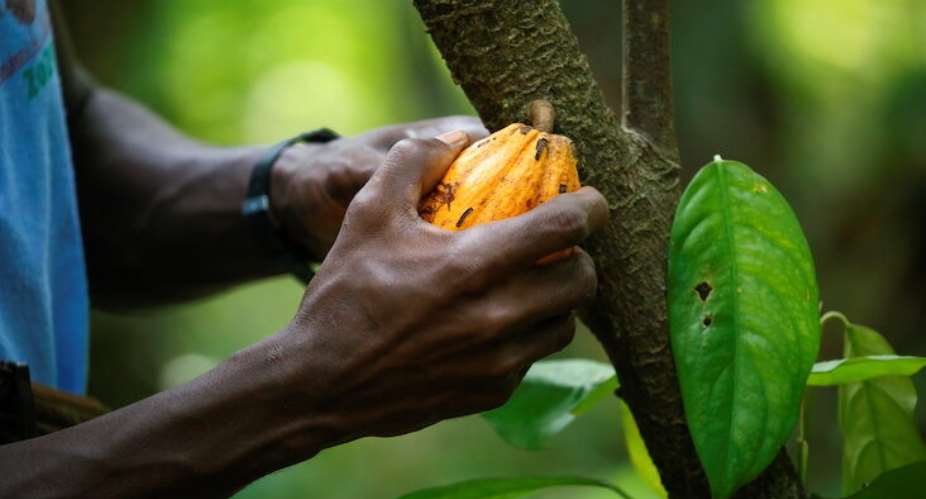The ongoing trial of the former head of the COCOBOD, Dr Opuni, has revealed the extent of the baleful influence of the agrochemical industry, on our ruling elites.
Yet, because of its importance as an economic pillar, it is imperative that the COCOBOD and giants of the global chocolate industry, collaborate to make organic farming in Ghana - using certified agroforestry principles - as their focus, for ensuring a climate-resilient climate-smart organic future, for Ghana's cocoa sector.
As regards the health of our people, all food production in Ghana needs to be converted to organic farming, in which agroforestry principles empower smallholder farmers nationally, asap. Truth be told, we are literally paying money to buy foodstuff (including fruits and vegetables) with unacceptable levels of chemical residue, in reality.
The cocoa sector is a classic example: We need to aim to become the biggest growers of organic cocoa in the world - and Apostle Kojo Sarfo Kantanka's innovative organic growth medium and organic pesticides could be used to do so, with giant factories producing those inputs.
What's going on in the cocoa sector, shows the dearth of transformative leadership, which is attuned to the fast-expanding global export markets' demand for organic agricultural produce.
Luckily, a replicable organic farming business model already exists in the Western Region, executed in world-class fashion, by the brilliant founder of B-BOVID, Issa Ouedraogo - who has chalked on-the-ground successes using a social impact agroforestry business model that bedrock the welfare and well-being of host communities from which his company, B-BOVID Farms Limited's smallholder oil palm farmer-stakeholders, hail and farm in, as the company's strategic-underpinning, and main focus.
The cocoa industry could replicate his social impact business model to secure the future of Ghana's cocoa industry, at a time when climate change is impacting rural Ghana so negatively.
He can share his experience in producing certified organic oil palm fruit, with governments of the day - who should collaborate with successful agrisector agripreneurs like him, perhaps via his NGO, T.R.A.C.T.O.R. His commitment to farming organically, through agroforestry climate-smart-farming, is an inspiration.
There is no time to waste, as the cocoa industry is being decimated by the powerful big-thieves-in-high-places, who are destroying our protected forest reserves to mine their gold deposits.
Yet, Ghana's priceless natural capital is a zillion times more valuable than all the gold, which is mined in them - because of the existentially-irreplaceable ecosystem services they provide: particularly as global climate change will inexorably lead to water scarcity, as sure as day follows night, if we don't make the protection of the remainder of our natural heritage, a top national security concern.
Organic farming in Ghana, using certified agroforestry principles, must go hand in hand with the preservation of the remainder of Ghana's natural capital, and bedrock of all our greening Ghana initiatives.
In light of all the above, the COCOBOD and the giants of the global chocolate industry, must make organic farming in Ghana, using certified agroforestry principles, their focus, on ensuring a climate-resilient climate-smart organic future, for Ghana's cocoa sector.





 Saglemi Housing Project will not be left to rot – Kojo Oppong Nkrumah
Saglemi Housing Project will not be left to rot – Kojo Oppong Nkrumah
 Transport fares hike: GPRTU issue two-day ultimatum
Transport fares hike: GPRTU issue two-day ultimatum
 ARC endorses Alan as presidential candidate – Buaben Asamoa
ARC endorses Alan as presidential candidate – Buaben Asamoa
 Akufo-Addo appoints Kwasi Agyei as new Controller and Accountant-General
Akufo-Addo appoints Kwasi Agyei as new Controller and Accountant-General
 PNC dismiss reports of mass resignations
PNC dismiss reports of mass resignations
 PAC advocates for revenue collectors to be engaged on commission basis, not full...
PAC advocates for revenue collectors to be engaged on commission basis, not full...
 Genser Energy commissions 110km of natural gas pipeline at Anwomaso
Genser Energy commissions 110km of natural gas pipeline at Anwomaso
 Naa Torshie calls for tolerance, peace ahead of 2024 election
Naa Torshie calls for tolerance, peace ahead of 2024 election
 Asantehene commends Matthew Opoku Prempeh for conceiving GENSER Kumasi Pipeline ...
Asantehene commends Matthew Opoku Prempeh for conceiving GENSER Kumasi Pipeline ...
 Let’s do away with ‘slash and burn politics’ in Ghana — Dr Adutwum
Let’s do away with ‘slash and burn politics’ in Ghana — Dr Adutwum
